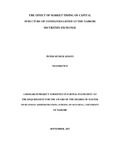| dc.description.abstract | Financing plays an essential role in increasing a company's capabilities to develop its business. As firms grow, they need to raise capital, and that can come from either debt or equity, influencing the overall capital structure of the firm. There are different theories guiding appropriate financing decisions. They try to guide the corporate finance managers in choosing the optimal proportion of debt and equity for their firm. These include: The trade-off theory, the pecking order theory, market timing theory (Baker and Wurgler, 2002), the irrelevance theory (Modigliani and Miller, 1958), and agency theory (Jensen and Meckling, 1976).This study aims to examine the effect of Market Timing Theory (MTT) from Baker and Wurgler (2002) on capital structure of firms, in the context of the Nairobi Securities Exchange. The essence of MTT is that firms are more likely to issue equity when their market values are high relative to book and past market values and to repurchase equities (if allowed by regulation) when their market values are low. The study adopted the descriptive research design. The study was conducted on 26 companies listed in the Nairobi securities exchange and which issued Initial Public Offerings or rights issues between 2006 and 2014. Data was obtained from published annual financial statements and reports maintained by Nairobi Securities Exchange (NSE) and The Capital Markets Authority (CMA) for a period of eight years. The proposed model of this paper used regression analysis to measure the effect of market timing, proxied by the ratio of market value to book value, on the sources of financing firms though increase in equities. The findings of this analysis concluded that as the ratio of market value to book value increases, firms tend to increase their equity though an increase to the number of shares outstanding. It was hence concluded that market timing influences the overall capital structure of the firm through increase in equities. | en_US |

